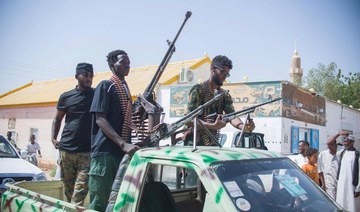AL-MUKALLA: Despite ongoing threats by Houthi leaders in Yemen that they will continue to attack international shipping in the Red Sea, the number of strikes on vessels has drastically fallen in recent weeks.
The group has not claimed credit for any assaults on ships since April 10. Analysts speculate that the militia might be running out of missiles and drones, or air strikes on Houthi targets by the US and UK could have damaged their launchers.
Since November, the Houthis have launched hundreds of drones, ballistic missiles and remotely controlled and explosive-laden boats at international commercial and naval ships in the Red Sea, Bab Al-Mandab Strait and the Gulf of Aden. They say they are acting in support of the Palestinian people and the aim is to force Israel to allow more humanitarian aid to enter the Gaza Strip.
Compared with the early days of their campaign, the Houthis have claimed credit for significantly fewer assaults this month, and international marine agencies have reported a decline in the number of strikes.
The organization UK Maritime Trade Operations, which records attacks on shipping, has not received any notifications of incidents in the Red Sea or Gulf of Aden since April 7, one of the longest periods with no reported attacks since the start of the Houthi campaign almost six months ago.
The US Central Command last reported intercepting Houthi missiles and drones on April 16. Prior to that it had been issuing almost daily notifications.
Despite the decline in attacks on shipping, the Houthis’ Political Office said on Monday it had instructed its military forces to escalate attacks in the Red Sea and Arabian Sea on ships linked to or bound for Israel in response to what it described as “genocide crimes” committed by Israel against Palestinians in Gaza.
Mohammed Al-Basha, an expert on the Middle East with the Navanti research group in the US, cautioned that the recent extended period without any claims of attacks does not necessarily mean the Houthis have halted their attacks in the Red Sea.
“The absence of frequent daily claims could also represent a strategic decision or the possibility of diplomatic or secret talks, rather than an operational inability,” he wrote in a message posted on social media platform X.
“This might suggest that the missile stockpile of the Houthis is diminishing, while the production of drones remains steady.”
Yemeni military analyst Brig. Gen. Mohammed Al-Kumaim suggested airstrikes in recent months by US and UK forces might have diminished the capability of the Houthis to launch attacks, and said the group might be settling into a war of attrition.
“The US may have targeted the few mobile missile launchers belonging to the Houthi militia; they need three or four launchers if they have 100 missiles,” he told Arab News.
The UN’s special envoy for Yemen, Hans Grundberg, said on Monday he held talks with Houthi negotiator Mohammed Abdul Sallam and Omani officials in Muscat to explore ways in which to advance a UN-brokered peace plan for Yemen while also reducing wider tensions in the Middle East.
Abdul Aziz Al-Bukair, a Houthi government minister of state, said the militia’s representatives discussed with Grundberg their recent negotiations with Saudi authorities, as well as issues such as payment of wages to public-sector workers, the reopening of key roads in Yemen, and oil exports.
The ongoing, UN-led peace efforts to end the near decade-long war in Yemen suffered a severe blow when the Houthis began attacking ships in the Red Sea in November.

























